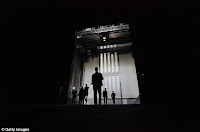
It's that time of the year when Advent begins to merge into Christmas. The anticipation and expectation of the last month now blends into the joy of announcing that a Saviour has been born. And we are being held in that hope.
Meanwhile, at the Tate Modern in London there is a new exhibition, 30 metres in length, 10 metres in width, creating the impression of entering into a vast black hole. The Polish artist, Miroslaw Balka, said he is trying to remind visitors of recent Polish history - the ramp into the black hole chamber is like the entrance to the Ghetto in Warsaw, or the trucks which took Jews away to the camps of Treblinka or Auschwitz. Says Balka, "You'll start to touch darkness. I'm touching the subject of disappearing".
For many during the joy of Christmas, darkness still lurks. The threat of redundancy, a friendship turned sour, a broken marriage, a tarnished reputation, an empty space at the dinner table... Black holes come in various forms.
But we are called to hope, and Isaiah the prophet historically and poetically described how the people of Israel were to go into a black hole... and then come out of it again. The southern kingdom of Judah lies in wait, its days are numbered. Babylon was to mercilessly trample all over the nation. Dark times, indeed.
But we are called to hope, and spurred on by the interesting reflection given on this blog on 8th December by my father-in-law (thanks Alan!), I decided to use Isaiah's image of a tree stump (chapter 11) as the dominant theme at our Carol Service last Sunday evening. A shoot will come up, a Branch will bear fruit. New growth will occur, and peace will mark the new Messianic age through the coming of the Anointed One of God. A message brimming with the hope that still remains so applicable to our world today.
In 1945 some graffiti was found on the wall of a basement in Koln, Germany - where a Jew is thought to have been hiding from the Gestapo:
"I believe in the sun even when it isn't shining, I believe in love even when I am alone, I believe in God even when He is silent".
Thank God that in Christ the silence has been shattered, the black holes of life are shot through with brilliant light, and we can go on our way rejoicing again.
A year after the black hole of 9/11, the theologian Walter Brueggemann wrote a reflection in which the theme of hope-ful-ness was all-pervasive. In it he included the following words:
"We turn to you in that heaviness, for we do afresh ponder our mortality, think about our naked exposure, fully cognizant of the fragility that is the truth of our lives. And so we turn to you seeking assurance, consolation, embrace. And you receive us, faithful mother who holds, sure father who welcomes and embraces, and we settle in peaceableness even midst the chaos, we do... and we give you thanks.... You are risen in power and wonder; you are risen out of the shambles of death and terror and doubt and fear; You are risen to turn the world to peace and justice and freedom and well-being; You are risen with healing wings to cure our diseased hurts and our public pathologies... Let us, good Lord of the dying and the living, hide ourselves in Thee. And then let us follow your Easter way, that the world shriveled in deathliness may turn to joy and to newness". (Inscribing the Text: Sermons & Prayers of Walter Brueggemann, 2004, Augsburg Fortress, p1175-177).
The people walking in darkness have now seen a great light, so may God keep hope alive in us.






